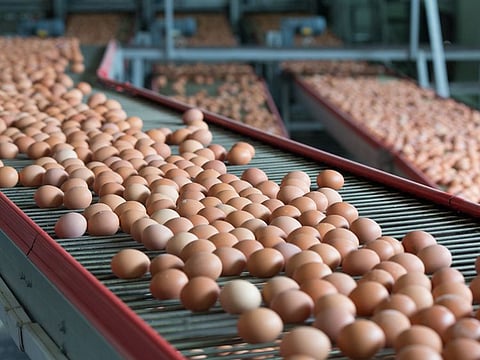Cracking the future of the egg industry in UAE
New tech, sustainable practices and an emphasis on quality are redefining the sector

Major shifts in consumption habits and dietary preferences are driving the egg industry to evolve at a rapid pace, encouraging local poultry manufacturers to constantly adapt and innovate to meet the changing demands of consumers.
From incorporating cutting-edge technologies to elevate the production quality to introducing healthier ranges and implementing sustainable farm solutions, the dynamic poultry industry in the UAE has harnessed the power of innovation to align their offerings with the evolving market trends and drive the sector towards a more diverse, sustainable, and health-focused future.

“Demand in the eggs category, which especially after the pandemic has gained a significant presence in our diet, is expected to grow further in the future. Besides the standard eggs, new sub-categories have emerged such as the enriched variety – Omega 3, Lutein and Vitamin D; free-range; and organic. These categories keep gaining traction as consumers begin to pay greater attention to their nutrition,” says Hassan Safi, CEO of Al Ain Farms, which produces around 120 million eggs annually.
“Eggs are one of the best sources of protein, so it is important to give consumers the best value for their money, while keeping in mind their health and nutrition requirement as well as the industry’s need to innovate,” he adds.
Heightened awareness of the health benefits of eggs is fueling demand in this category. Many consumers are now opting for eggs to meet their specific dietary needs, such as low-fat and high-protein diets.
“Owing to our greater exposure to social media and access to information, consumers are becoming aware of the benefits of eating a healthy diet. That’s why more and more consumers now look for healthier varieties such as the Omega-3 eggs,” says a spokesperson from Al Jazira Poultry Farm.
Innovation in product development
One of the most notable changes in the egg industry is the rising demand for enriched and specialty eggs such as organic, free-range, pasteurised, and smoked eggs. This has led to a surge in the production of these ranges, transforming the traditional egg production landscape.
“We constantly develop new products to meet the nutritional needs of the market,” says Andrew Gibson, Senior Vice President – Poultry, Al Ghurair Foods, the manufacturer of the popular Jenan eggs.

“Our offerings include Omega 3-enriched eggs, lutein eggs, DHA-Omega with vitamin D3-enriched eggs, and Omega-Lutein eggs. These enrichments are derived from the natural feed resources provided to our hens during their production cycle, such as flaxseeds and vegetarian feed sources. By consistently innovating and improving our products, Jenan ensures our consumers can enjoy eggs that are not only delicious but also a valuable source of essential nutrients,” Gibson explains.
Technology-led approach
Advancements in technology are influencing how eggs are collected, packaged, and distributed across the UAE. By automating production systems and integrating new tech in the farms, poultry brands in the country are not only increasing production capacity but also contributing to more sustainable and efficient practices in the sector.
Al Jazira has implemented a highly advanced egg collection and packaging machine that can process 120,000 eggs per hour. “Our strong cold chain infrastructure keeps products in good condition until they are delivered to supermarkets,” says the spokesperson.
Jenan has also employed an automated system for collecting eggs from its chicken houses, utilising advanced laying systems from the world’s leading provider of innovative equipment, Big Dutchman in Germany.
“This system not only streamlines the collection process but also ensures the well-being of hens at our farms. Additionally, we’ve integrated an automated egg weighing, grading, and packing system from Moba Group in the Netherlands, further enhancing our operations. This innovation guarantees consistent quality, minimises human error, and ensures that consumers receive eggs of the highest standard, fostering trust and satisfaction in our products,” explains Gibson.
At Al Ain Farms, priority is always given to quality and freshness, says Safi.
“We use a sterilisation process using the ultraviolet (UV) light, which eliminates any bacteria from the eggshells. Furthermore, having the state-of-the-art technology allows the company to detect and remove any defective eggs as every egg is checked 16 times for any cracks before it is moved to the packing area. On top of that, our system ensures each egg is delivered to the right weight category and automatically packs the eggs into trays,” he points out.
Consumer consciousness
Meanwhile, growing environmental awareness as well as the changing food choices of eco-conscious consumers have pushed the egg industry to implement more sustainable practices. From adopting eco-friendly farming processes to investing in renewable energy sources for production and distribution, egg manufacturers in the region are exploring ways to reduce their carbon footprint.
“As a FSCC-certified company, we guarantee the best living conditions for all our hens. We have improved the sustainability of the feed given to hens to reduce the environmental footprints of egg production,” says Safi from Al Ain Poultry, adding, “We have achieved energy efficiency using LED lights and efficient heating and cooling systems and taken measures to control water usage and water pollution. Furthermore, we use the latest technology in egg grading and packaging.”

Integrating cutting-edge as well as eco-friendly tech in the production processes, Arabian Food Production Company – with Khaleej and Dana eggs in its portfolio – has launched a production facility, Gulf International Poultry Farm (GIPF), in Oman to supply locally produced eggs in the wider GCC area.
“Production processes at GIPF are based on the world-famous Japanese ISE model, an integrated poultry management system that aims to achieve the highest standards in safety, health, efficiency, and quality,” says Dr Suheel Ahmed, Group CEO, adding, “We encourage the use of bi/tricycles inside the Modern Poultry Farm (MPF) premises, wherever possible, to lower the usage of fuel-powered vehicles.”
Al Jazira Poultry in the UAE is also actively engaged in improving its production processes and farm management keeping sustainability as its top priority.
“We have insulated buildings to keep hens in a cooler environment, which help reduce our use of energy. We use packaging materials that are made from recycled water bottles and waste paper. Other sustainable practices include recirculating used water in keeping the poultry houses cool and using solar power lighting systems in our facilities,” says the spokesperson.
Aligning with the UAE’s food safety and quality standards, poultry brands are making substantial investments to elevate their production quality while maintaining top-notch standards throughout the supply chain.
“Monitoring and quality standards in the UAE are very high, encouraging local producers to adopt the best practices in the industry and ensure only the best raw materials are imported into the country. It’s also critical to emphasise the value of locally-produced eggs as they are the freshest possible eggs that consumers can get throughout the year. Customers can also be assured of the quality of locally-produced eggs as all farms in the UAE follow strict standards,” explains the spokesperson from Al Jazira.
Although there is a growing awareness of the health benefits of eggs, there’s still significant potential to further promote egg consumption. “Dispelling misconceptions surrounding the nutritional benefits of eggs is a top priority for Jenan,” says Gibson.
“To address this concern, we conduct regular testing on the eggs we produce, verifying the nutritional values indicated on the label. Moreover, we perform antibiotic-free tests through internationally recognised laboratories, ensuring that our consumers receive accurate information and can enjoy the full nutritional benefits of our eggs with confidence.” ■



